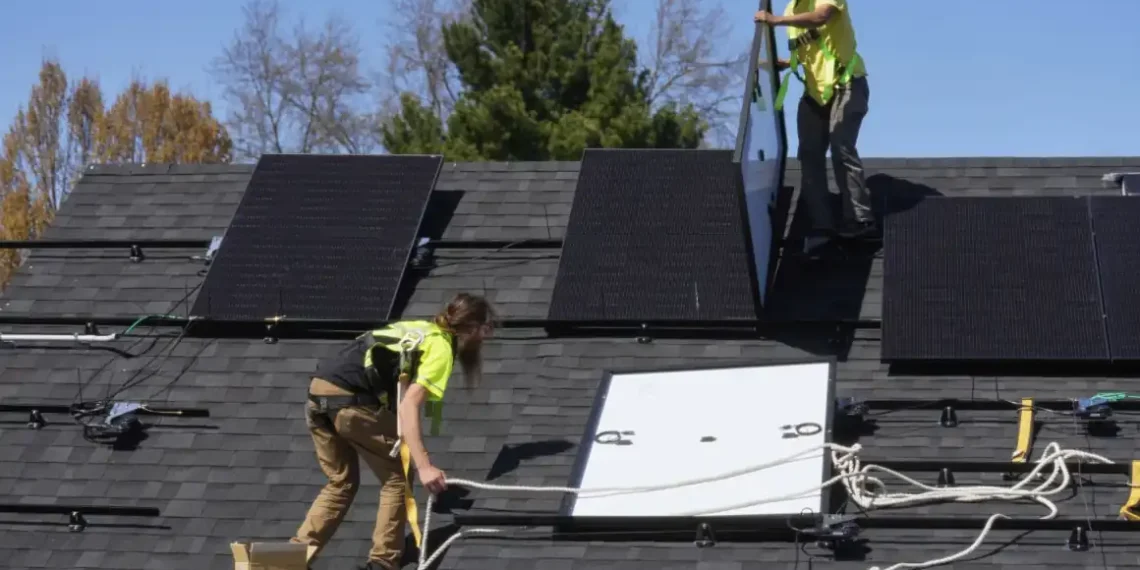Sweeping Energy Cuts Passed by Congress Threaten Green Tech Growth
Clean Energy Faces Major Setbacks as GOP Megabill Heads to Trump’s Desk
A sweeping Republican-backed tax and spending bill passed by Congress Thursday is poised to roll back billions in clean energy investments, endangering climate initiatives, job growth, and household savings across the U.S.
The legislation—awaiting the signature of former President Donald Trump—slashes tax credits for solar, wind, and electric vehicles while boosting support for fossil fuel production. Analysts warn the bill could slow the country’s transition to cleaner energy and increase utility bills for millions of Americans.
Fossil Fuels Get a Boost, While Clean Energy Takes a Hit
The bill advances U.S. production of oil, coal, and natural gas—fuels that are among the largest contributors to global warming and extreme weather events. At the same time, it removes or weakens incentives for renewables that advocates say are vital to reducing emissions and curbing pollution.
Among the clean energy rollbacks: major tax credits for home upgrades, large-scale renewable projects, and electric vehicles are being dramatically scaled down or cut altogether.
Home Energy Credits Set to Expire, Raising Costs for Families
One of the most immediate impacts will be felt by homeowners. Tax credits created under the Biden-era climate law helped families afford costly but energy-efficient improvements—such as rooftop solar panels, heat pumps, and insulation upgrades.
These credits, covering up to 30% of installation costs, made clean energy upgrades more accessible. For example:
- A $20,000 solar system came with a $6,000 tax credit.
- Heat pumps worth several thousand dollars could yield up to $2,000 in federal reimbursement.
In 2023 alone, more than 2 million families used the credits for home improvements, and another 1.2 million claimed them for solar and battery systems, according to the U.S. Treasury Department.
Now, both credits will be eliminated after December 31.
“No one asked Congress to make their energy bills even higher,” said Steven Nadel, executive director of the American Council for an Energy-Efficient Economy. “Removing these incentives will push monthly costs up for households and businesses.”
EV Incentives Eliminated, Threatening Clean Transportation Goals
The bill also scraps federal tax credits for electric vehicles. Currently, buyers can receive up to:
- $7,500 for new EVs
- $4,000 for used EVs
Those credits will expire after September 30, a move critics say will hurt adoption rates just as the industry is gaining momentum. Transportation accounts for 28% of U.S. greenhouse gas emissions, and EVs are considered a cornerstone of emission reduction strategies.
While EV sales have climbed—making up 8% of all new U.S. car sales last year—the average EV price remains steep at $57,734, well above the $48,799 average for gas-powered vehicles.
Tightened Deadlines Jeopardize Wind and Solar Projects
The bill accelerates deadlines for utility-scale wind and solar projects to qualify for federal tax credits—timelines clean energy developers say are nearly impossible to meet.
Only projects that begin construction within a year of the law’s enactment and are operational by end of 2027 will qualify.
That change puts about 28 gigawatts of planned solar and wind projects at risk of losing support, according to Atlas Public Policy.
Currently, wind power accounts for 10% of U.S. electricity and solar 4%. Both were projected to triple their contributions by 2030—targets now in jeopardy.
“Without those tax incentives, large-scale clean energy becomes financially unfeasible,” said an industry analyst. “And with Trump pulling the U.S. out of the Paris climate agreement again, there’s no longer a federal commitment to renewables.”
Instead, the legislation favors traditional energy sources—coal, oil, natural gas—as well as nuclear energy, which proponents say are more reliable due to their consistency.
Experts Warn of Higher Utility Bills and Reduced Grid Reliability
Clean energy advocates say the bill will do more than delay climate progress—it may make energy more expensive and the power grid more fragile.
With AI-driven data centers increasing national electricity demands and extreme weather events becoming more frequent, analysts project average utility costs could rise by $100–$200 per household annually in the near term.
“This bill risks blackouts, energy insecurity, and greater dependence on foreign oil,” warned Lori Lodes, executive director of Climate Power. “At the very moment the grid is under pressure, we’re making it harder to add renewables and stabilize prices.”
While some projects already in motion may proceed, the uncertainty created by the bill may deter investment in next-generation energy technology and weaken U.S. energy independence.
Bottom Line
As the GOP megabill awaits Trump’s signature, the rollback of clean energy policies is set to reshape the U.S. energy landscape—limiting climate progress, straining households, and threatening long-term national security. With clean energy momentum now stalled, the future of green innovation hangs in the balance.
This article was rewritten by JournosNews.com based on verified reporting from trusted sources. The content has been independently reviewed, fact-checked, and edited for accuracy, neutrality, tone, and global readability in accordance with Google News and AdSense standards.
All opinions, quotes, or statements from contributors, experts, or sourced organizations do not necessarily reflect the views of JournosNews.com. JournosNews.com maintains full editorial independence from any external funders, sponsors, or organizations.
Stay informed with JournosNews.com — your trusted source for verified global reporting and in-depth analysis. Follow us on Google News, BlueSky, and X for real-time updates.














